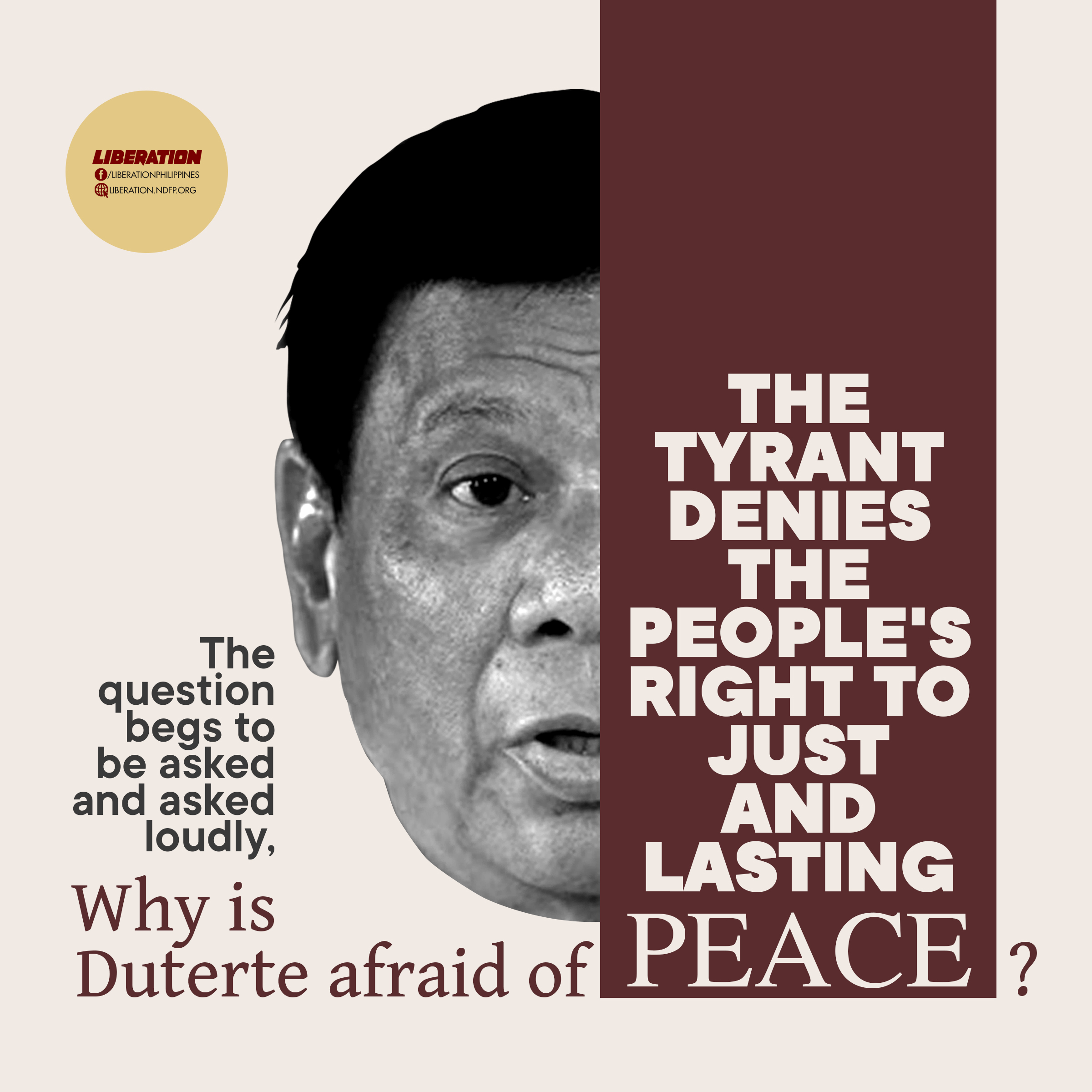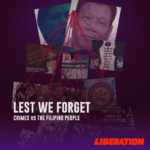THE TYRANT DENIES THE PEOPLE’S RIGHT TO JUST AND LASTING PEACE

by Leon Castro
Government of the Republic of the Philippines (GRP) President Rodrigo Duterte announced last August 14 that he has terminated the peace process with the National Democratic Front of the Philippines (NDFP). It came weeks after he, his spokesperson, and his peace adviser separately declared again suspending the peace negotiations. There was a need, the GRP said, to review the achievements of the GRP-NDFP peace talks, including all agreements between both parties since 1992 when The Hagu e Joint Declaration was signed.
“I have terminated the talks with the Reds—with the Communist Party of the Philippines (CPP), with Sison—because in the series of agreements before, even [during] the time of [GRP President Benigno] Aquino, they entered into so many things that they scattered the privileges and power which they wanted,” Duterte said in his usual rambling way. We summed it all and it would really appear that it was a coalition government [they wanted] and I said, “I cannot give you an inch of that even. I cannot give you what is not mine,” Duterte added.
Duterte went on to declare yet again that his government would instead resume the fight against the revolutionary movement. “We have suffered and—in numbers. And I think it would not be good [to continue with the peace process]. We will just have to continue fighting,” he added.
Duterte’s latest announcement of the termination of the peace process is actually nonnews, NDFP Chief Political Consultant Prof. Jose Maria Sison said. Sison explained it was not the first time Duterte terminated the GRP-NDFP peace negotiations. The first time was actually in February 2017, as he again did on November 2017 with his Proclamation 360 that he followed with Proclamation 374 accusing the CPP and the New People’s Army (NPA) as “terrorist” organizations. Sison said Duterte’s proclamations had the malicious intent of making doubly sure that he had killed the peace negotiations.
Either Duterte was lying or ignorant of what he was saying. There had only been one formal round of talks throughout the Aquino regime and the agreements signed in The Oslo Joint Statement of February 2011 the reactionary government tried to abrogate with full malevolent intent. In addition, Prof. Sison had repeatedly denied the NDFP asked or wanted a coalition government with Duterte’s own murderous regime.
But beyond Duterte’s unfounded accusations that the NPA—and not his bloodthirsty military and police—is on a rampage in both rural and urban areas, the question of why is he bent on throwing away the substantial gains achieved by the peace negotiations with the NDFP begs to be asked. If he claims his regime is suffering from the attacks by the NPA, why would he think that to continue fighting with the revolutionary army is the best and only solution? If he still claims he is for peace and development, why can he not admit that agrarian reform and national industrialization—prospective agreements of which are already submitted to him by his own peace negotiators for approval—are tangible efforts to addressing the roots of the armed conflict?
TYRANT AND DICTATOR
GRP President Duterte has completely unmasked himself and his regime as a tyrant and dictator in the mold of Ferdinand Marcos and Gloria Macapagal-Arroyo. Duterte made a complete turnaround from proclaiming himself as the country’s first “leftist” president to being the chief executive of a cabal that rules through terror, tyranny, and corruption. His Senate is presided by, like him, a misogynist. His Speaker of the House of Representatives—manouvered into place by his daughter and Davao City Mayor Sara Duterte—is herself a tyrant, cheat, plunderer and human rights violator of the worst kind. He has replaced the Supreme Court Chief Justice with one who has voted to bury Marcos at the Libingan ng mga Bayani. Members of his own personal and official families are involved in smuggling, graft and corruption, and influence-peddling. They have lifestyles that could rival Imelda Marcos’s. Recently, investigative reports have shown that Christopher “Bong” Go has profited billions in government contracts as his most trusted assistant and operator.
The number of extrajudicial killing victims of Duterte’s drug war, mostly poor, has breached 20,000. The reign of terror remains unabated despite increasing opposition and condemnation in the Philippines and abroad. Despite all these deaths, Duterte’s so-called war has only succeeded in allowing tons of illegal drugs into the country while bigtime drug lords, including presidential son and Davao City Vice Mayor Paolo Duterte, remain at large or are being exonerated publicly by no less that Duterte himself.
Like his idols Marcos and Arroyo, Duterte is succeeding in running the country’s economy to the ground. From the get-go, Duterte’s anti-people Tax Reform for Acceleration and Inclusion (TRAIN) measure caused inflation rates that overtook so-called growth rates and hit 6.4 percent last August. While the Philippine Peso lingers at around P53 to P54 to the US dollar, hot money from the speculative market is leaving the country, making the Philippines one of the worst performing economies in the world. The country’s foreign debt has also increased dramatically under Duterte and has gone beyond P7 trillion. As a result of all these, oil prices and prices of basic commodities have drastically gone up and continued to do so, angering more and more Filipinos. Duterte’s approval rating has also consistently taken a dive since the start of the year, one that could no longer be fixed by his totally discredited propaganda machine.
Meanwhile, poverty alleviation measures promised by Duterte the presidential candidate and Duterte the newly-installed president were exposed to be nothing but hot air and lies. Labor contractualization remains the main mode of employment for workers while genuine agrarian reform is still a dream under his regime.
But are these developments really surprising, more so that no one among the NDFP-nominated progressives remained in Duterte’s Cabinet while the most reactionary disciples of neo-liberalization are still well-entrenched? Barely a year after progressives were rejected by the Commission on Appointments, corrupt practices have returned with a vengeance at the Department of Social Work and Development at the behest of corrupt politicians across the street at the House of Representatives. At the Department of Agrarian Reform, more and more agricultural lands are being handed to landlords and land grabbers. And more than a year after the National Anti-Poverty Commission has published a progressive anti-poverty roadmap, not a single recommendation is being implemented.
In the absence of honest to goodness pro-people policies and programs by the Duterte government, the NDFP-GRP peace process was among the very few avenues for genuine social change. Alas, Duterte is determined to deny the people their right to just and lasting peace.
NATIONAL INDUSTRIALIZATION AND AGRARIAN REFORM
Last June 16, the NDFP released backchannel documents it crafted with the GRP Negotiating Panel. The documents represented weeks of hard work not just by the NDFP and its consultants and resource persons but the GRP Negotiating Panel, advisers and staff, not to mention the Third Party Facilitator, The Royal Norwegian Government. These consisted of The Stand-Down Agreement; Guidelines and Procedures towards an Interim Peace Agreement, and the Resumption of Talks, with an attached timetable; The Initialled Interim Peace Agreement; and, The NDFP Proposed Draft of the Amnesty Proclamation, which was given to the GRP and the Third Party Facilitator. These documents were all ready for approval by both panels on the fifth round of formal talks last June 28. Four rounds of informal talks throughout April to June 2018 preceded the scheduled formal in June.
The “Stand Down Agreement”—a temporary cessation of hostilities—between the NDFP and the GRP, was in fact signed and approved by the chairpersons of the negotiating panels and witnessed by the Third Party Facilitator. It was due for announcement and implementation on June 21, a week before the formal talks.
The GRP-NDFP peace negotiation has been postponed, canceled, and terminated by Duterte several times. Duterte thinks nothing of the hard work by everyone involved in crafting agreements already hailed as real solutions to the worst evils of Philippine society: poverty, corruption, and subservience to foreign interests. Instead of signing the initialed drafts of agrarian reform and rural development, as well as national industrialization and economic development agreements, he listened to militarists in his regime—especially defense secretary Delfin Lorenzana, national security adviser Hermogenes Esperon, and interior and local government and interior secretary Eduardo Año—who were all bred during the last years of Ferdinand Marcos’ martial law and wantonly let loose upon the people during Gloria Arroyo’s own reign of terror. With bloodthirsty officials like these three as his most trusted hatchet men, is it surprising that Duterte’s way of addressing the roots of the armed conflict in this country is heightened fascism and terrorism?
The NDFP and all its allied revolutionary organizations, led by the CPP and the NPA, on the other hand, said they condemn how Duterte waylaid the peace process. While they are not intimidated by Duterte’s bluster and threats and are ready to continue defending the Filipino people, they have expressed willingness to resume peace negotiations with any reactionary government serious in negotiating basic reforms that address the roots of the armed conflict. The NDFP said it is hopeful that a genuine peace negotiation shall contribute to the liberation of the Filipino people from the bondage of poverty, neglect and plunder by foreign and local ruling elite.
Perhaps Duterte is not ready to admit the NDFP’s seriousness and sincerity in negotiating peace. Perhaps he was surprised when he was shown by his own negotiating panel that the NDFP has initialed national industrialization and economic development as well as agrarian reform and rural development draft agreements. Perhaps he himself was not ready to implement peace even when the NDFP publicly announced it is ready to sign a stand down agreement between the NPA and the AFP and PNP, even an interim peace agreement deal. Perhaps Duterte was not really sincere when he promised he would release all political prisoners. Whatever the case may be, his repeated pronouncements to terminate the negotiations defy logic if he really wanted peace.
The question begs to be asked and asked loudly, “Why is Duterte afraid of peace?”
But, then again, is peace possible with a tyrant?



